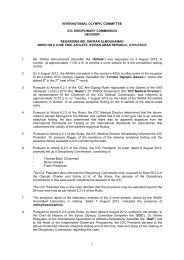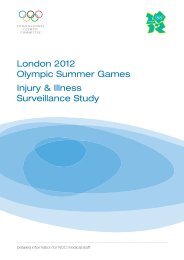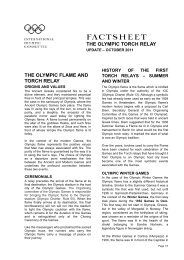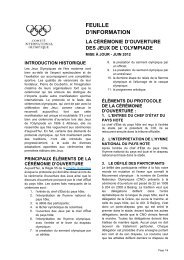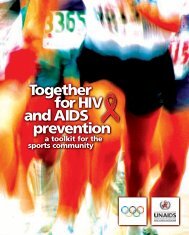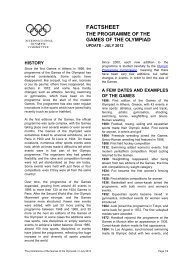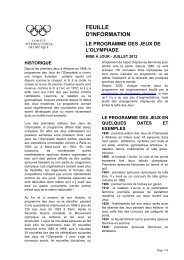8th WORLD CONFERENCE ON SPORT AND THE ENVIRONMENT
8th WORLD CONFERENCE ON SPORT AND THE ENVIRONMENT
8th WORLD CONFERENCE ON SPORT AND THE ENVIRONMENT
You also want an ePaper? Increase the reach of your titles
YUMPU automatically turns print PDFs into web optimized ePapers that Google loves.
5. The Vancouver Declaration<br />
<strong>8th</strong> World Conference on Sport and the Environment<br />
International Cooperation and Development Department<br />
Report<br />
The participants in the <strong>8th</strong> World Conference on Sport and the Environment included National<br />
Olympic Committees, International Sports Federations, Organising Committees for the Olympic<br />
Games (BOCOG, VANOC, LOCOG and Sochi 2014), Candidate Cities, representatives of the<br />
International Olympic Committee, International Paralympic Committee, Olympians and the United<br />
Nations Environment Programme (UNEP), partners of the Olympic Movement, sport and recreation<br />
events organisers, environmental organisations, research institutions, and other members of the<br />
Olympic Movement.<br />
The Conference acknowledged the signifi cance of the location and date of this event, with it being<br />
held on the traditional territories of Four Host First Nations, and with the Vancouver 2010 Winter<br />
Olympic Games and Paralympic Winter Games being less than a year away, and expressed their<br />
gratitude for their involvement and presence.<br />
Two principal themes provided the contextual backdrop for the Conference:<br />
1. The current economic crisis is global, affecting everyone. While the crisis presents additional<br />
challenges, it also provides unique opportunities in which environmental and sustainability matters<br />
must remain the highest priority. The economy and the environment are to be dealt with together<br />
to enhance environmental sustainability.<br />
2. The importance of involving young people in the world of sport is acknowledged by all. The IOC’s<br />
emphasis on this is shown by the launch of the fi rst ever Youth Olympic Games in Singapore in<br />
2010, with a signifi cant educational component, including strong environmental content. Early<br />
exposure to the best sustainable development practices and appropriate education of future<br />
generations on environmental matters will have a lasting impact.<br />
With the above themes in mind, the Conference focused on the key aspects of Inspiration and<br />
Innovation that fuel the participants’ joint efforts to advance sustainability through sport.<br />
Fourteen years after declaring “environment” as the third pillar of the Olympic Movement, alongside<br />
sport and culture, the Conference provided an opportunity to refl ect on the hard work undertaken<br />
and the achievements made during this period, and the growing number of success stories. This<br />
provides fi tting inspiration for an ever-increasing number of constituents.<br />
It was acknowledged that creativity and innovation are critical components in achieving<br />
demonstrable results. The Conference participants put forward the following specifi c conclusions<br />
and recommendations:<br />
1. National Olympic Committees (NOC) play an increasing role in ensuring continuous<br />
involvement of the sports world in sustainable development.<br />
It is acknowledged that NOCs have to tackle different challenges within their own environments.<br />
Nevertheless, it is essential that NOCs recognise their important role as a major conduit for<br />
action to further the Olympic Movement’s sustainability agenda.<br />
NOCs are encouraged to continue to develop their understanding of the programmes, practices<br />
and legacies of Olympic Organising Committees, as well as of the proposals and objectives of<br />
candidate cities.<br />
It is recommended that NOCs identify and reach out to domestic and external partners with<br />
specifi c projects that could be supported within their own communities, and consider including<br />
provisions for sustainable actions in their contractual arrangements.<br />
NOCs are encouraged to form partnerships with local government entities in order to implement<br />
specifi c environmental projects.<br />
Page 59 / 80





